Analysis of International Trade Agreements and Poverty Reduction
VerifiedAdded on 2022/09/18
|6
|1272
|39
Report
AI Summary
This report delves into the intricacies of international relations, specifically examining the effects of free trade agreements (FTAs) on poverty reduction and economic development. It highlights the significance of business management and support, emphasizing the impact of trade treaties on trade barriers. The report analyzes the United States-Korea Free Trade Agreement (FTA), discussing the challenges and solutions related to trade management, including the influence of political and economic factors. It also explores the ASEAN-China Free Trade Area (ACFTA) and the Australia-United States free trade agreement, offering insights into how these agreements affect poverty levels. The report references the positive effects of free trade on countries like the United States and China, providing historical context and data to support its claims, including the impact of the World Trade Organization and the Great Depression. It concludes by suggesting strategies for fostering better business relationships and mitigating potential challenges within the context of free trade.
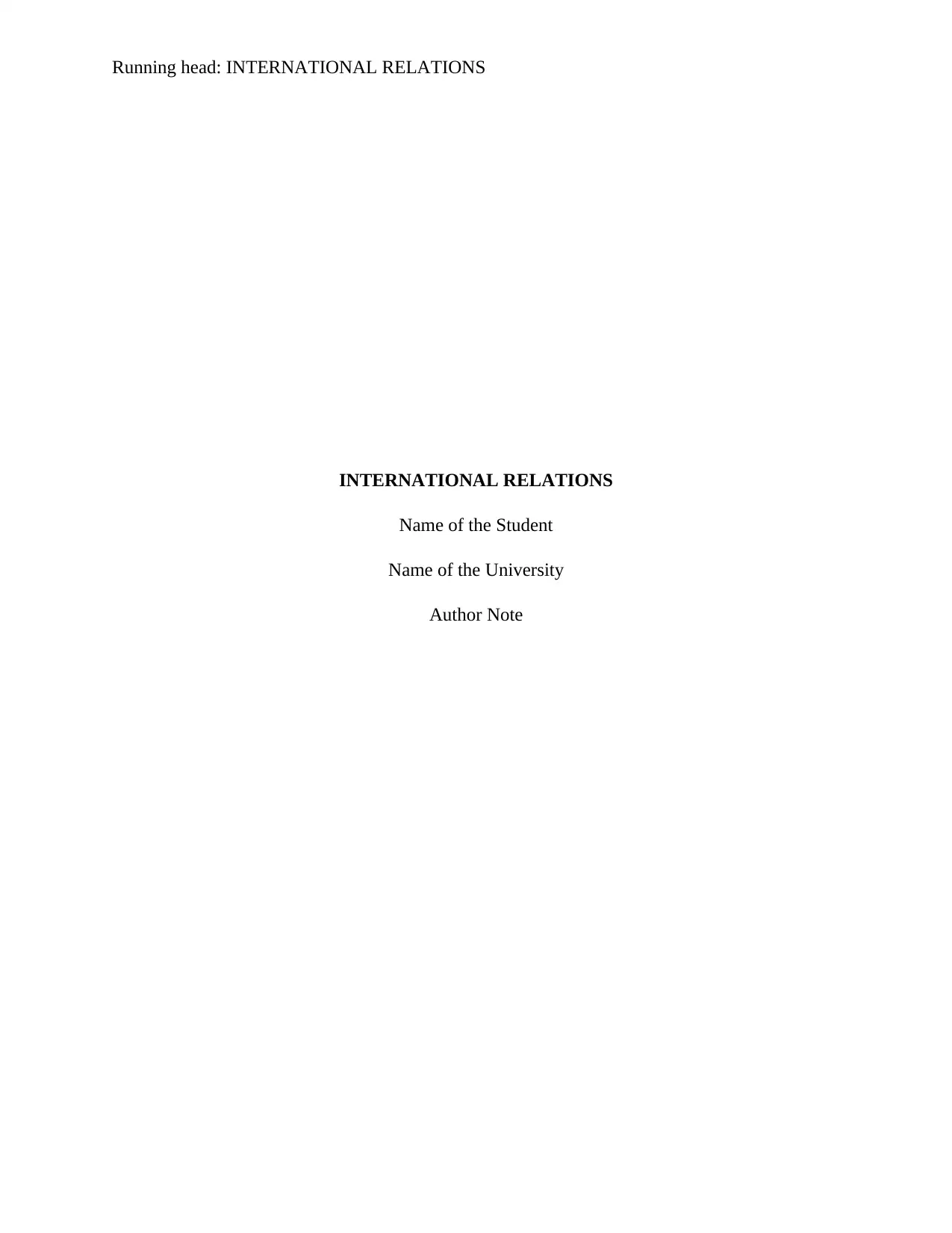
Running head: INTERNATIONAL RELATIONS
INTERNATIONAL RELATIONS
Name of the Student
Name of the University
Author Note
INTERNATIONAL RELATIONS
Name of the Student
Name of the University
Author Note
Paraphrase This Document
Need a fresh take? Get an instant paraphrase of this document with our AI Paraphraser
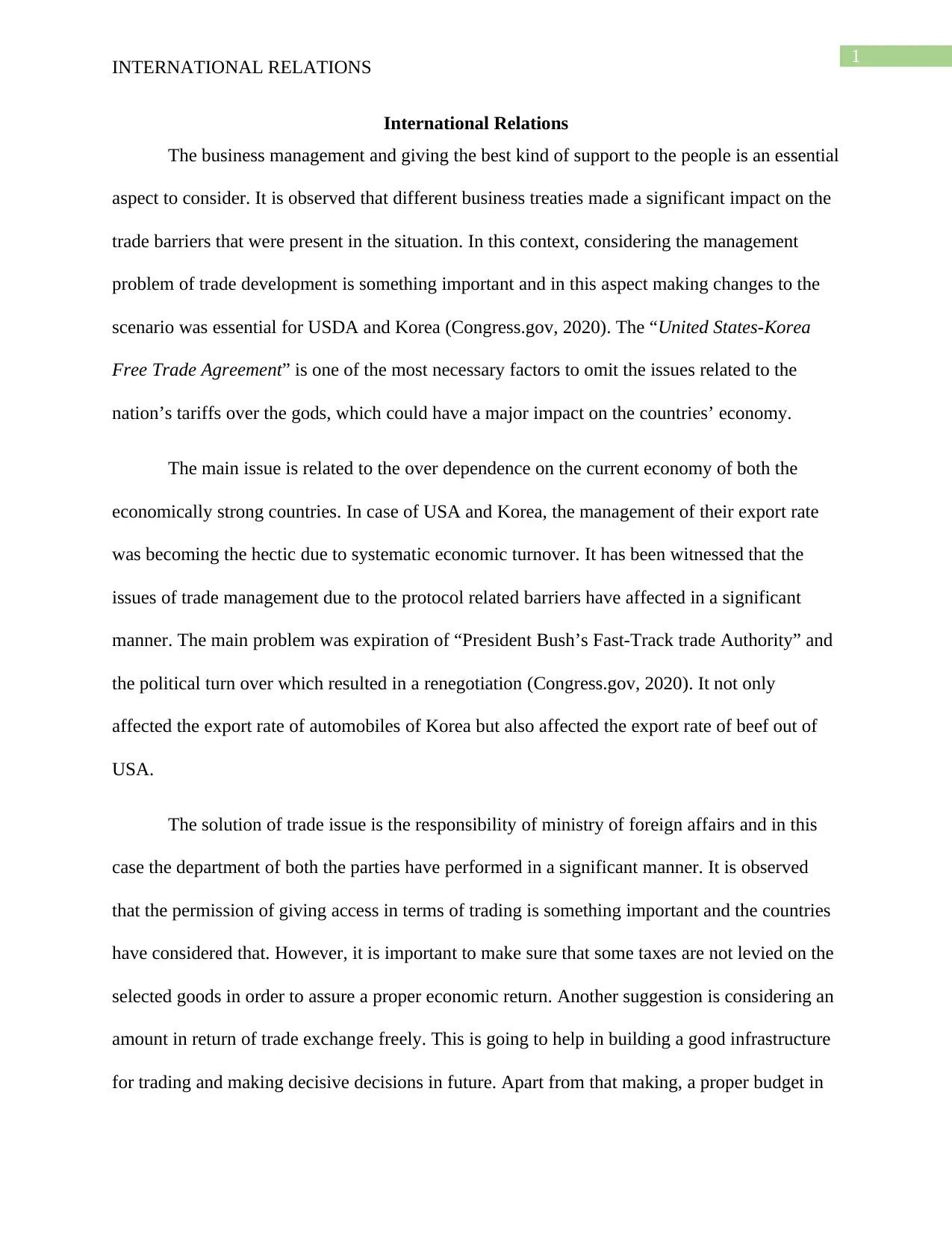
1
INTERNATIONAL RELATIONS
International Relations
The business management and giving the best kind of support to the people is an essential
aspect to consider. It is observed that different business treaties made a significant impact on the
trade barriers that were present in the situation. In this context, considering the management
problem of trade development is something important and in this aspect making changes to the
scenario was essential for USDA and Korea (Congress.gov, 2020). The “United States-Korea
Free Trade Agreement” is one of the most necessary factors to omit the issues related to the
nation’s tariffs over the gods, which could have a major impact on the countries’ economy.
The main issue is related to the over dependence on the current economy of both the
economically strong countries. In case of USA and Korea, the management of their export rate
was becoming the hectic due to systematic economic turnover. It has been witnessed that the
issues of trade management due to the protocol related barriers have affected in a significant
manner. The main problem was expiration of “President Bush’s Fast-Track trade Authority” and
the political turn over which resulted in a renegotiation (Congress.gov, 2020). It not only
affected the export rate of automobiles of Korea but also affected the export rate of beef out of
USA.
The solution of trade issue is the responsibility of ministry of foreign affairs and in this
case the department of both the parties have performed in a significant manner. It is observed
that the permission of giving access in terms of trading is something important and the countries
have considered that. However, it is important to make sure that some taxes are not levied on the
selected goods in order to assure a proper economic return. Another suggestion is considering an
amount in return of trade exchange freely. This is going to help in building a good infrastructure
for trading and making decisive decisions in future. Apart from that making, a proper budget in
INTERNATIONAL RELATIONS
International Relations
The business management and giving the best kind of support to the people is an essential
aspect to consider. It is observed that different business treaties made a significant impact on the
trade barriers that were present in the situation. In this context, considering the management
problem of trade development is something important and in this aspect making changes to the
scenario was essential for USDA and Korea (Congress.gov, 2020). The “United States-Korea
Free Trade Agreement” is one of the most necessary factors to omit the issues related to the
nation’s tariffs over the gods, which could have a major impact on the countries’ economy.
The main issue is related to the over dependence on the current economy of both the
economically strong countries. In case of USA and Korea, the management of their export rate
was becoming the hectic due to systematic economic turnover. It has been witnessed that the
issues of trade management due to the protocol related barriers have affected in a significant
manner. The main problem was expiration of “President Bush’s Fast-Track trade Authority” and
the political turn over which resulted in a renegotiation (Congress.gov, 2020). It not only
affected the export rate of automobiles of Korea but also affected the export rate of beef out of
USA.
The solution of trade issue is the responsibility of ministry of foreign affairs and in this
case the department of both the parties have performed in a significant manner. It is observed
that the permission of giving access in terms of trading is something important and the countries
have considered that. However, it is important to make sure that some taxes are not levied on the
selected goods in order to assure a proper economic return. Another suggestion is considering an
amount in return of trade exchange freely. This is going to help in building a good infrastructure
for trading and making decisive decisions in future. Apart from that making, a proper budget in
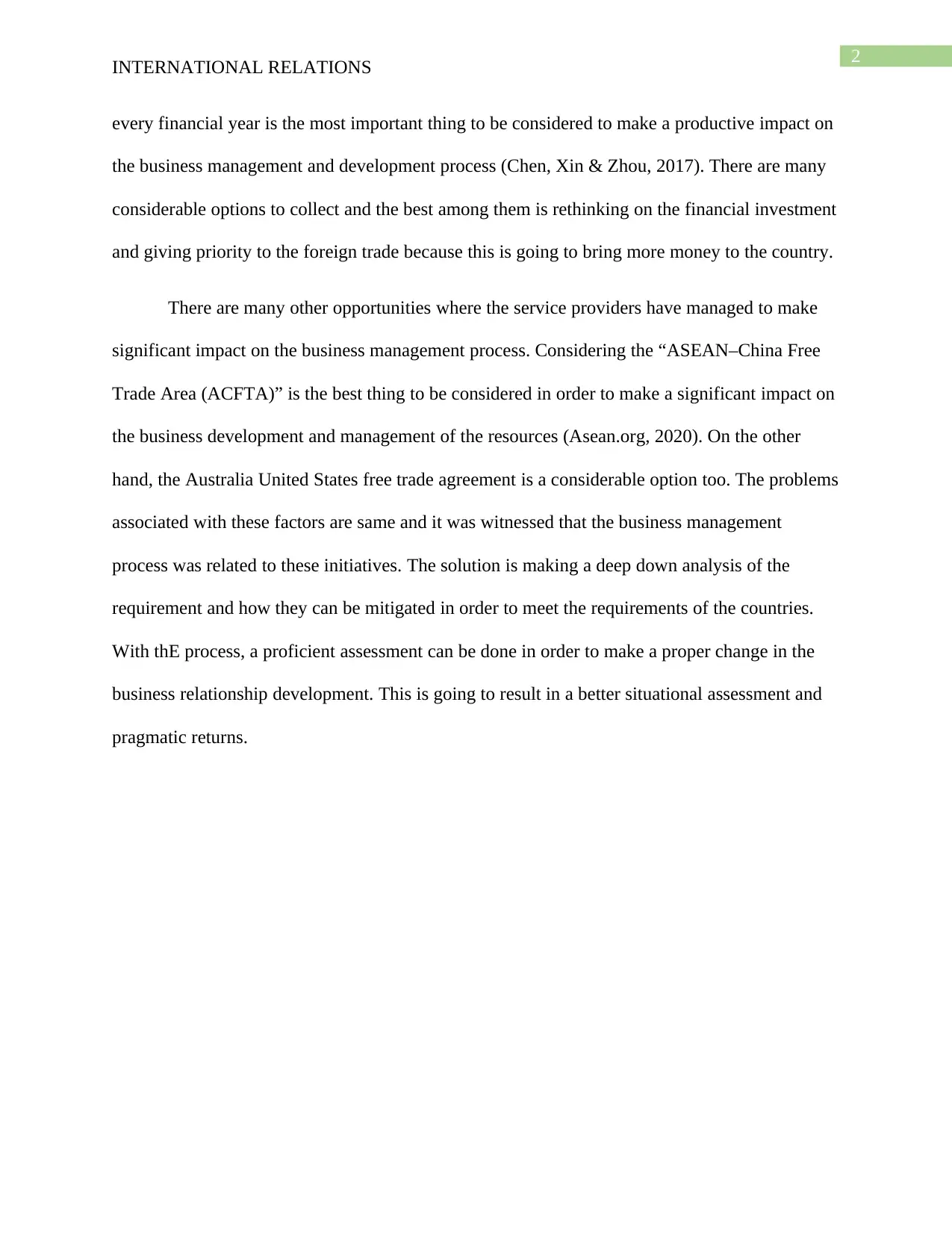
2
INTERNATIONAL RELATIONS
every financial year is the most important thing to be considered to make a productive impact on
the business management and development process (Chen, Xin & Zhou, 2017). There are many
considerable options to collect and the best among them is rethinking on the financial investment
and giving priority to the foreign trade because this is going to bring more money to the country.
There are many other opportunities where the service providers have managed to make
significant impact on the business management process. Considering the “ASEAN–China Free
Trade Area (ACFTA)” is the best thing to be considered in order to make a significant impact on
the business development and management of the resources (Asean.org, 2020). On the other
hand, the Australia United States free trade agreement is a considerable option too. The problems
associated with these factors are same and it was witnessed that the business management
process was related to these initiatives. The solution is making a deep down analysis of the
requirement and how they can be mitigated in order to meet the requirements of the countries.
With thE process, a proficient assessment can be done in order to make a proper change in the
business relationship development. This is going to result in a better situational assessment and
pragmatic returns.
INTERNATIONAL RELATIONS
every financial year is the most important thing to be considered to make a productive impact on
the business management and development process (Chen, Xin & Zhou, 2017). There are many
considerable options to collect and the best among them is rethinking on the financial investment
and giving priority to the foreign trade because this is going to bring more money to the country.
There are many other opportunities where the service providers have managed to make
significant impact on the business management process. Considering the “ASEAN–China Free
Trade Area (ACFTA)” is the best thing to be considered in order to make a significant impact on
the business development and management of the resources (Asean.org, 2020). On the other
hand, the Australia United States free trade agreement is a considerable option too. The problems
associated with these factors are same and it was witnessed that the business management
process was related to these initiatives. The solution is making a deep down analysis of the
requirement and how they can be mitigated in order to meet the requirements of the countries.
With thE process, a proficient assessment can be done in order to make a proper change in the
business relationship development. This is going to result in a better situational assessment and
pragmatic returns.
⊘ This is a preview!⊘
Do you want full access?
Subscribe today to unlock all pages.

Trusted by 1+ million students worldwide
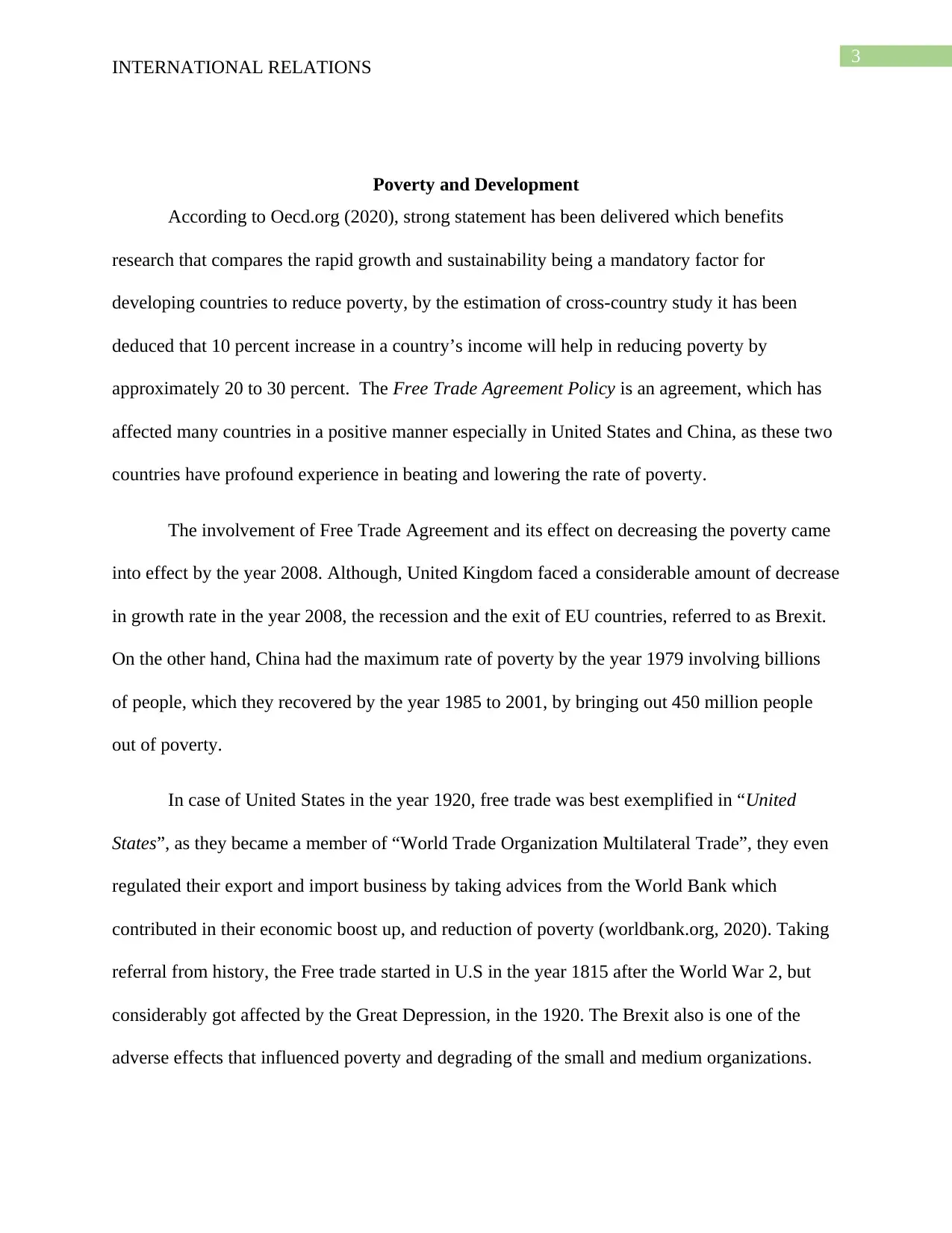
3
INTERNATIONAL RELATIONS
Poverty and Development
According to Oecd.org (2020), strong statement has been delivered which benefits
research that compares the rapid growth and sustainability being a mandatory factor for
developing countries to reduce poverty, by the estimation of cross-country study it has been
deduced that 10 percent increase in a country’s income will help in reducing poverty by
approximately 20 to 30 percent. The Free Trade Agreement Policy is an agreement, which has
affected many countries in a positive manner especially in United States and China, as these two
countries have profound experience in beating and lowering the rate of poverty.
The involvement of Free Trade Agreement and its effect on decreasing the poverty came
into effect by the year 2008. Although, United Kingdom faced a considerable amount of decrease
in growth rate in the year 2008, the recession and the exit of EU countries, referred to as Brexit.
On the other hand, China had the maximum rate of poverty by the year 1979 involving billions
of people, which they recovered by the year 1985 to 2001, by bringing out 450 million people
out of poverty.
In case of United States in the year 1920, free trade was best exemplified in “United
States”, as they became a member of “World Trade Organization Multilateral Trade”, they even
regulated their export and import business by taking advices from the World Bank which
contributed in their economic boost up, and reduction of poverty (worldbank.org, 2020). Taking
referral from history, the Free trade started in U.S in the year 1815 after the World War 2, but
considerably got affected by the Great Depression, in the 1920. The Brexit also is one of the
adverse effects that influenced poverty and degrading of the small and medium organizations.
INTERNATIONAL RELATIONS
Poverty and Development
According to Oecd.org (2020), strong statement has been delivered which benefits
research that compares the rapid growth and sustainability being a mandatory factor for
developing countries to reduce poverty, by the estimation of cross-country study it has been
deduced that 10 percent increase in a country’s income will help in reducing poverty by
approximately 20 to 30 percent. The Free Trade Agreement Policy is an agreement, which has
affected many countries in a positive manner especially in United States and China, as these two
countries have profound experience in beating and lowering the rate of poverty.
The involvement of Free Trade Agreement and its effect on decreasing the poverty came
into effect by the year 2008. Although, United Kingdom faced a considerable amount of decrease
in growth rate in the year 2008, the recession and the exit of EU countries, referred to as Brexit.
On the other hand, China had the maximum rate of poverty by the year 1979 involving billions
of people, which they recovered by the year 1985 to 2001, by bringing out 450 million people
out of poverty.
In case of United States in the year 1920, free trade was best exemplified in “United
States”, as they became a member of “World Trade Organization Multilateral Trade”, they even
regulated their export and import business by taking advices from the World Bank which
contributed in their economic boost up, and reduction of poverty (worldbank.org, 2020). Taking
referral from history, the Free trade started in U.S in the year 1815 after the World War 2, but
considerably got affected by the Great Depression, in the 1920. The Brexit also is one of the
adverse effects that influenced poverty and degrading of the small and medium organizations.
Paraphrase This Document
Need a fresh take? Get an instant paraphrase of this document with our AI Paraphraser
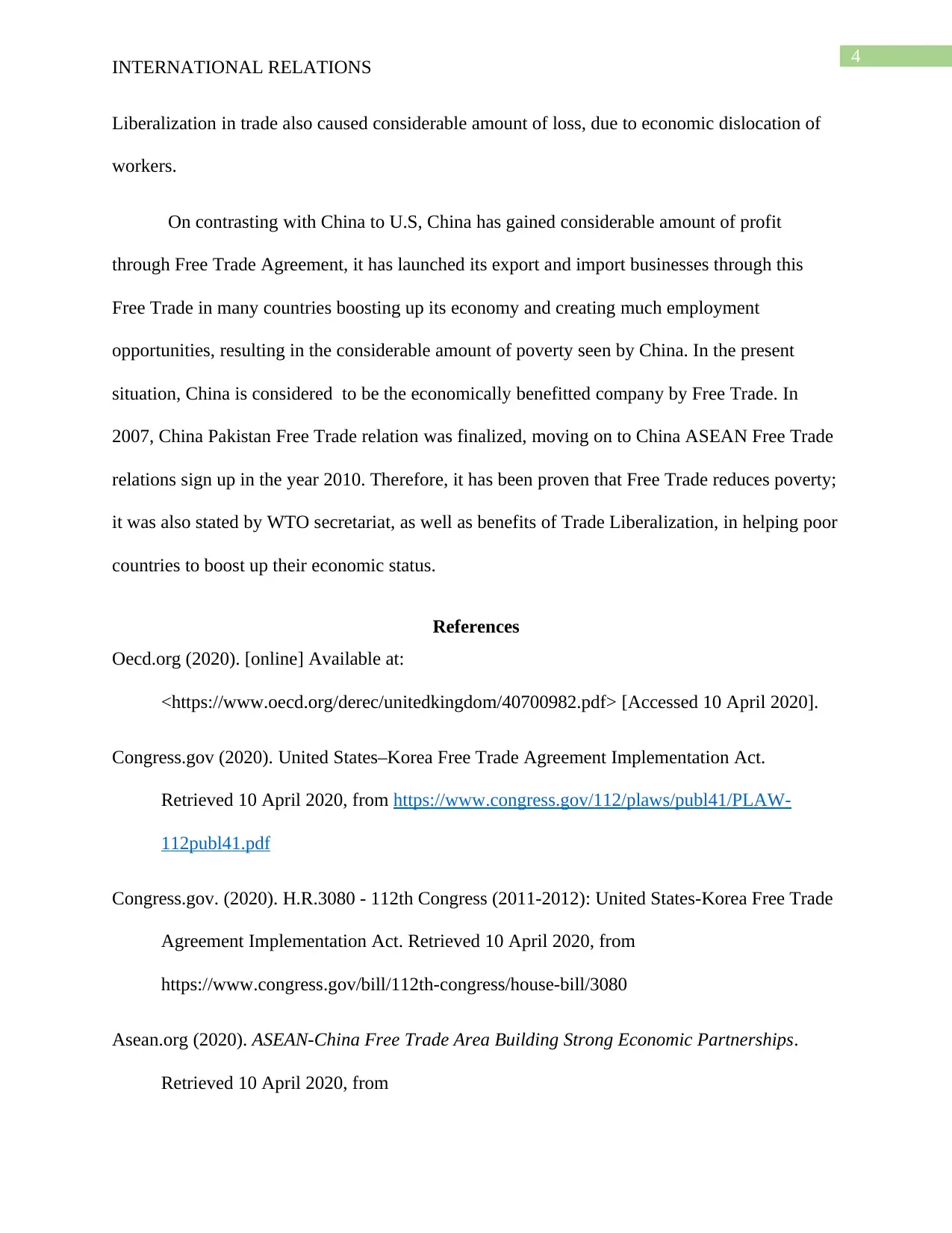
4
INTERNATIONAL RELATIONS
Liberalization in trade also caused considerable amount of loss, due to economic dislocation of
workers.
On contrasting with China to U.S, China has gained considerable amount of profit
through Free Trade Agreement, it has launched its export and import businesses through this
Free Trade in many countries boosting up its economy and creating much employment
opportunities, resulting in the considerable amount of poverty seen by China. In the present
situation, China is considered to be the economically benefitted company by Free Trade. In
2007, China Pakistan Free Trade relation was finalized, moving on to China ASEAN Free Trade
relations sign up in the year 2010. Therefore, it has been proven that Free Trade reduces poverty;
it was also stated by WTO secretariat, as well as benefits of Trade Liberalization, in helping poor
countries to boost up their economic status.
References
Oecd.org (2020). [online] Available at:
<https://www.oecd.org/derec/unitedkingdom/40700982.pdf> [Accessed 10 April 2020].
Congress.gov (2020). United States–Korea Free Trade Agreement Implementation Act.
Retrieved 10 April 2020, from https://www.congress.gov/112/plaws/publ41/PLAW-
112publ41.pdf
Congress.gov. (2020). H.R.3080 - 112th Congress (2011-2012): United States-Korea Free Trade
Agreement Implementation Act. Retrieved 10 April 2020, from
https://www.congress.gov/bill/112th-congress/house-bill/3080
Asean.org (2020). ASEAN-China Free Trade Area Building Strong Economic Partnerships.
Retrieved 10 April 2020, from
INTERNATIONAL RELATIONS
Liberalization in trade also caused considerable amount of loss, due to economic dislocation of
workers.
On contrasting with China to U.S, China has gained considerable amount of profit
through Free Trade Agreement, it has launched its export and import businesses through this
Free Trade in many countries boosting up its economy and creating much employment
opportunities, resulting in the considerable amount of poverty seen by China. In the present
situation, China is considered to be the economically benefitted company by Free Trade. In
2007, China Pakistan Free Trade relation was finalized, moving on to China ASEAN Free Trade
relations sign up in the year 2010. Therefore, it has been proven that Free Trade reduces poverty;
it was also stated by WTO secretariat, as well as benefits of Trade Liberalization, in helping poor
countries to boost up their economic status.
References
Oecd.org (2020). [online] Available at:
<https://www.oecd.org/derec/unitedkingdom/40700982.pdf> [Accessed 10 April 2020].
Congress.gov (2020). United States–Korea Free Trade Agreement Implementation Act.
Retrieved 10 April 2020, from https://www.congress.gov/112/plaws/publ41/PLAW-
112publ41.pdf
Congress.gov. (2020). H.R.3080 - 112th Congress (2011-2012): United States-Korea Free Trade
Agreement Implementation Act. Retrieved 10 April 2020, from
https://www.congress.gov/bill/112th-congress/house-bill/3080
Asean.org (2020). ASEAN-China Free Trade Area Building Strong Economic Partnerships.
Retrieved 10 April 2020, from
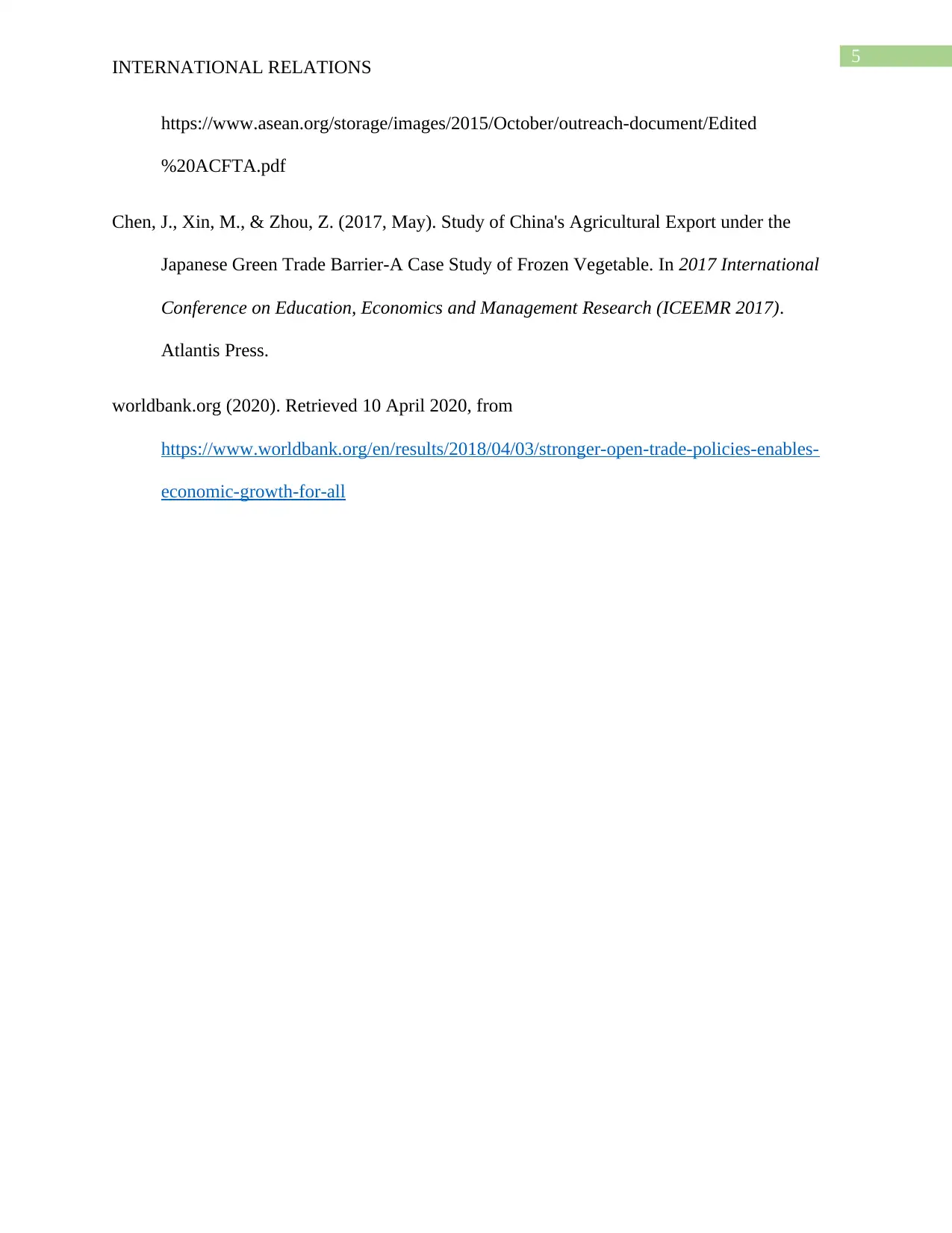
5
INTERNATIONAL RELATIONS
https://www.asean.org/storage/images/2015/October/outreach-document/Edited
%20ACFTA.pdf
Chen, J., Xin, M., & Zhou, Z. (2017, May). Study of China's Agricultural Export under the
Japanese Green Trade Barrier-A Case Study of Frozen Vegetable. In 2017 International
Conference on Education, Economics and Management Research (ICEEMR 2017).
Atlantis Press.
worldbank.org (2020). Retrieved 10 April 2020, from
https://www.worldbank.org/en/results/2018/04/03/stronger-open-trade-policies-enables-
economic-growth-for-all
INTERNATIONAL RELATIONS
https://www.asean.org/storage/images/2015/October/outreach-document/Edited
%20ACFTA.pdf
Chen, J., Xin, M., & Zhou, Z. (2017, May). Study of China's Agricultural Export under the
Japanese Green Trade Barrier-A Case Study of Frozen Vegetable. In 2017 International
Conference on Education, Economics and Management Research (ICEEMR 2017).
Atlantis Press.
worldbank.org (2020). Retrieved 10 April 2020, from
https://www.worldbank.org/en/results/2018/04/03/stronger-open-trade-policies-enables-
economic-growth-for-all
⊘ This is a preview!⊘
Do you want full access?
Subscribe today to unlock all pages.

Trusted by 1+ million students worldwide
1 out of 6
Related Documents
Your All-in-One AI-Powered Toolkit for Academic Success.
+13062052269
info@desklib.com
Available 24*7 on WhatsApp / Email
![[object Object]](/_next/static/media/star-bottom.7253800d.svg)
Unlock your academic potential
Copyright © 2020–2026 A2Z Services. All Rights Reserved. Developed and managed by ZUCOL.




